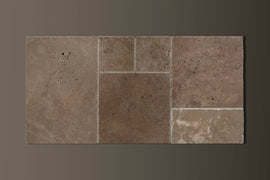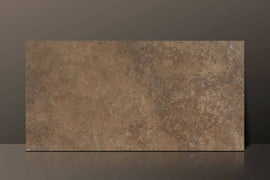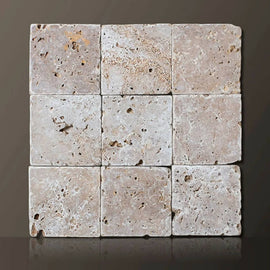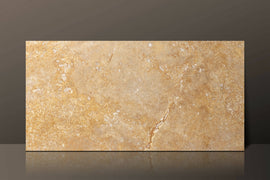Sort + Filter
Travertine Tiles For Kitchen, Foyers & Outdoors
Travertine Tiles are particularly long-lasting due to their resistance to moisture and humidity. When properly maintained, they do not disintegrate readily. Travertine tiles are also extremely resistant to extremely adverse weather, making them ideal for both interior and exterior applications like pools, lawn pathways, property sidewalls, etc. It is one of the most well-liked building stones due to its fibrous, marble-effect texture and alluring earth-tone colours. Architects, design professionals, and homeowners all adore travertine tile. Learn More
£34.50
£28.50
£39.00
£36.00
£55.50
£42.00
Travertine Tiles Is A Good Choice For Construction:
Travertine has long been considered one of the most popular types of stone for use in the creation of magnificent architectural marvels that have withstood the test of time. Many people believe that travertine is obsolete and no longer a good choice, but this is not true. Because of their proven durability and long-lasting beauty, travertine tiles or pavers are increasingly being used in modern construction projects. Because this natural stone is so versatile, it can be used both inside and outside of any structure. Travertine is typically offered as a floor cloth in tile shape and springs in a number of the latest shades consisting of tans, browns, rust, and beige tones. Travertine is a totally long-lasting stone, and even as it's miles less difficult to take care of than a few herbal stone varieties, it's miles very heavy. Because of its porous nature, the surface must remain sealed.
We Have More Tile Materials That You May Like, Check Here
Advantages Of Travertine Tiling:
Historical Significance
A travertine floor gives a property a sense of history and opulence because it is one of the oldest building materials known to humankind. It has a strong energy that draws attention in a quiet, restrained manner, with mild tones swirling in its hazy, shifting surface effects.
Easy to Source Flooring Surface
The most popular form of travertine for flooring uses is tile. One of the most often utilised stones in contemporary buildings is the travertine. It is often used for building facades, wall panels, and flooring since it is easily accessible.
Travertine Floor Idea is Economic as well as Functional
When it comes to outdoor applications that will be heavily impacted by natural or artificial forces, travertine is a fantastic choice. They have a beautiful finish, are sturdy, and as a result, have a long lifespan. Travertine stones maintain the opulent appearance of other high-end stones like marble, granite, and quartzite while being less expensive than them due to their greater resource availability.
Do You Like Marble Tiles? Check Here
Sustainable Flooring Choice
As travertine is found in nature, no artificial manufacturing processes are needed. Travertine requires less energy, produces fewer pollutants, and is simple to cut and remove.
These Floor Tiles Don’t Demand Much Attention
Compared to granite and marble, travertine tiles are simpler to maintain. You don't need to hire a cleaning crew or use pricey solutions to clean the grime off your tiles. Warm water and a light soap solution that is strong enough to remove grime but gentle enough to leave the tiles intact are all that are required.
Durable Stone Floor Finishes:
Polished Tile
Travertine tiles that are given a polished finish are very glossy because the stone has been polished for maximum smoothness and completely sealed. This is the best for stain resistance, but it is extremely slippery when wet.
Honed Tile
Honed travertine tiles have been filled and lightly polished, but it retains their matte-like finish and is less slick and slippery than polished stone. This is the most commonly used stone for indoor flooring.
Tumbled Tile
Tumbled Travertine has rounded corners and edges and has an aged, antique appearance. It has good traction underfoot but must be sealed against stains. It has an adorable vintage look however isn't always appropriate for heavy-use floors.
Brushed Tile
Travertine tiles that are given a brushed finish are textured by using wire brushes to give the stone a matte finish.
Use Treated Travertine Wall Cladding Tiles:
For interior wall decoration, travertine tiles are widely picked. But be aware that this material is probably going to absorb moisture. It cannot be used in locations where there is a chance of splashing as a result. It must be tested with a specific product before being used.
Travertine stone that has already been treated can be purchased as well, as one can use these treated tiles anywhere. The most preferred choice is panels that have been specially protected.
Plaster made of travertine is a further popular choice for finishing the walls. It is extremely resistant to abrasion as well as the development of mould and dangerous fungi. In humid areas like restrooms and kitchens, it works best.
Contact us for UK Tiles delivery
Work-tops.com sells all types of tiles, natural as well as engineered. Call 03301135868 or send your enquiry to info@work-tops.com.
Travertine Tile Installation; How To Get Your Stone Installed For This Christmas?
Prepare The Surface
Ensure that the surface where the tiles will be installed is clean, dry, and level. The installer will assess the condition of the substrate and make any necessary preparations, such as removing existing flooring or repairing any imperfections.
Installation Process
The installer will apply a suitable adhesive or mortar to the surface and lay the travertine tiles according to the planned layout. They will ensure proper spacing, alignment, and levelling of the tiles. Precision cutting may be required to fit tiles around edges, corners, or obstacles.
Grouting And Finishing
Once the tiles are set, the installer will apply grout to fill the gaps between the tiles. They will carefully clean off any excess grout and ensure a smooth, finished appearance. The grout may need time to cure before further use or sealing.
Sealing And Maintenance
Depending on the type of Travertine and the installer's recommendation, the tiles may need to be sealed to protect them from stains and moisture. Follow the installer's instructions for sealing and ongoing maintenance to keep your travertine looking its best.
Travertine Tiles Maintenance For Your Home:
Deep Cleaning
Periodically, consider a deep cleaning of your travertine tiles. You can hire professionals for this or use a specialised stone cleaner to remove any built-up grime.
Regular Cleaning
Sweep or vacuum the floors regularly to remove dirt and debris. This helps prevent scratches on the surface.
Clean the tiles with a pH-neutral stone cleaner or a mild dish soap mixed with water. Avoid using acidic or abrasive cleaners, as they can damage the surface.
Wipe Up Spills Promptly
Accidents happen, so it's essential to clean up spills as soon as possible. This prevents liquids from penetrating the porous surface and causing stains.
Use Soft Cloths Or Mop
When cleaning, use soft cloth or a mop with a soft microfiber head. Avoid abrasive scrub brushes or pads that can scratch the surface.






















